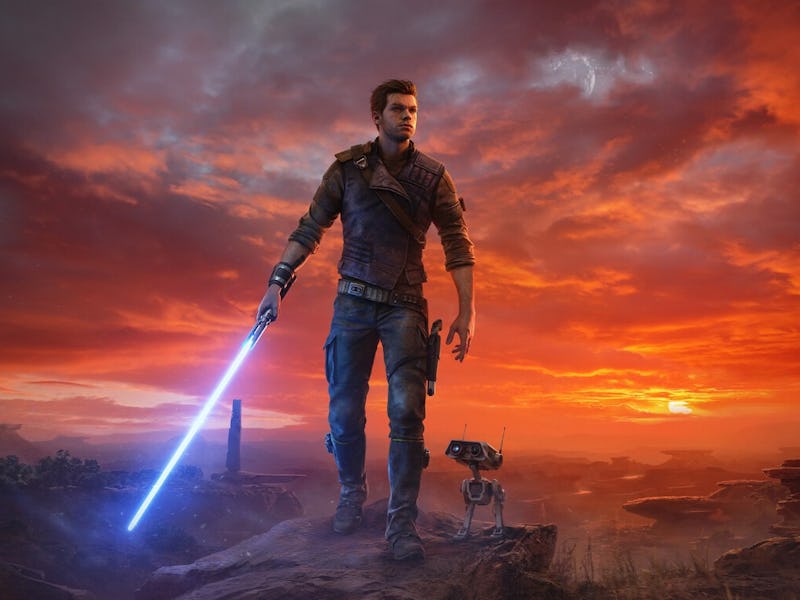The Grammys Interactive Category Doesn’t Get What’s Great About Video Game Soundtracks
A whole world of video game music isn’t represented at awards shows.

For only the second time in its 66-year history, the Grammys presented an award for the Best Score Soundtrack for Video Games and Other Interactive Media this weekend. This time, the honor went to the score for Star Wars Jedi: Survivor, by Stephen Barton and Gordy Haab. Their soundtrack is pitch-perfect Star Wars mood-setting that wouldn’t feel a bit out of place in any of the series’ films. But while it’s a deserving win, I can’t help but feel that the award underscores how limited our idea of what makes good video game music is.
Even aside from Star Wars Jedi: Survivor, the Grammys nominees — Call of Duty: Modern Warfare II, GOW Ragnarok, Hogwarts Legacy, and Stray Gods — mostly feel like they belong to the same club. Largely orchestral music from prestige games, none of those soundtracks would feel out of place in an award-winning film. The outlier of the bunch, Stray Gods, borrows from musical theater, but still it’s an homage to something other than games. Every one of them is a good soundtrack, but seen together, the nominees suggest that the best thing video game music can do is sound like it comes from the silver screen.
Star Wars Jedi: Survivor has a great soundtrack, but it’s not all game music has to offer.
The Grammys aren’t solely to blame here. Even at The Game Awards, there’s a similar kind of homogeneity, though it’s a bit less pronounced. At this year’s Game Awards, Hi-Fi Rush was an outlier for its excellent compilation soundtrack, but just like in other years, nominees are mostly the kind of prestige orchestral scores that evoke film soundtracks. And just like the Grammy nominees, they’re all great choices! The issue isn’t what’s being honored by awards, it’s what’s never even considered.
Video games are often seem as less serious than other artistic mediums, and they kind of have a chip on their shoulder as a result. That leads to developers like Hideo Kojima constantly trying to blur the line between films and games, the use of “cinematic” as a compliment, and The Game Awards being colloquially referred to as “the Oscars of video games.” The comparisons seem to suggest that the closer a game is to a film, the more it’s worthy of attention. The problem is that by trying to be more like films, games leave part of their own identity behind. Asking a non-gaming audience to validate game scores feels a little bit like Last of Us developer Neil Druckmann showing up at the Golden Globes recently only to find no one there really cared.
Early video game soundtracks sound nothing like film scores, and for good reason. The hardware that games were played on was incapable of representing nearly enough sounds to replicate an orchestra. But rather than make technologically inferior versions of film scores, game composers developed their own distinct sounds. Now known as chiptune, the new genre that emerged defined video game soundtracks through the ‘80s and ‘90s.
Cobalt Core has the kind of soundtrack you’ll only hear in a video game.
It’s not the dominant form anymore, but plenty of modern soundtracks still include elements of old-school video game music. Last year’s Cobalt Core and Sea of Stars soundtracks mix chiptune with other electronic and orchestral elements — and both are among my favorite scores of the year. There may be something inherently more impressive about a film-like orchestral score to audiences who don’t play video games, but we’re leaving behind an entire musical tradition if we don’t find a way to honor music that sounds distinctly video game-y.
Chiptune is out of fashion these days, but electronic music is still a mainstay in games. Jusant, for instance, expertly blends synth sounds with strings and piano in a way that perfectly suits its gameplay. I can’t stop thinking about the soundtrack for Humanity, which turns staccato beeps and synthesized voices into a fascinating score that’s both chill and unsettling.
Then there’s an entirely separate category of pop soundtracks, like the unnerving mix of electronic atmosphere and French pop songs in Decarnation. Another pop soundtrack, this one for Goodbye Volcano High, might be the best illustration of what makes video game music impossible to judge by the standards of other media. Not only is it fun to listen to on its own, Goodbye Volcano High’s score is central to its experience as a game about a band playing the most important show of its existence. The player has to actively strum along with songs at performances in rhythm sections, tying music to the experience in a way that just doesn’t translate outside of games.
Humanity’s score matches the game perfectly and sounds like nothing else out there.
Late last year, VGC asked video game composers to share their favorite music from 2023. The resulting list is a look at the incredible range of game soundtracks, some of which I’ve already mentioned here. The list is also packed with the kind of music that’s rarely mentioned outside of the limited sphere of game music obsessives, sitting right alongside some of this year’s Grammys nominees.
Music is just as important in video games as it is in movies, but that doesn’t mean it has to sound the same in both. Just as gameplay opens the door for experiences non-interactive art can’t provide, video games can be a window to music you’ll never hear coming out of a movie theater. Music like Star Wars Jedi: Survivor’s score do deserve to be honored. But while you’re congratulating it on its victory, don’t sleep on the kind of soundtracks only video games can offer. Your ears will thank you.
This article was originally published on